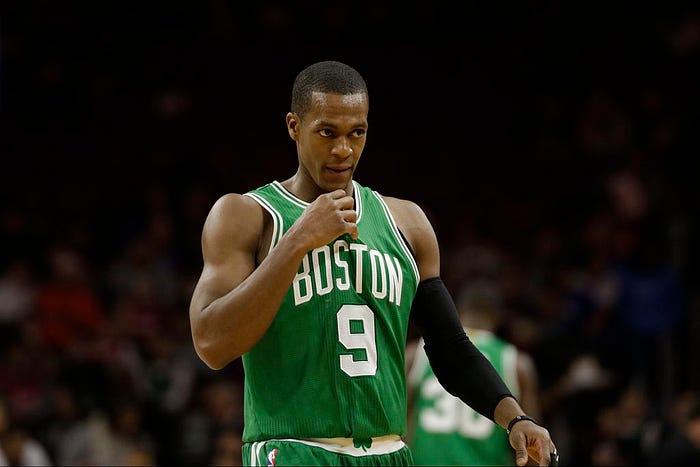The Strange Case of Rajon Rondo

I have no deep love for Rajon Rondo, in fact, I think the way he gave up during his tenure as a Dallas Maverick was shameful, particularly since we traded Jae Crowder, Brandon Wright, the ghost of Jameer Nelson, and two draft picks to rent him for a half-season. However, we did get Dwight Powell out of that trade (get better quick!), so instead of calling it the Rondo trade I can refer to it as the Powell trade and I feel instantly better.
Why didn’t Rondo work out in Dallas? He had issues with head coach Rick Carlisle over issues like play calling responsibilities and pace, which included a suspension over multiple arguments with Carlisle. The following season, when he was playing for the Kings and leading the league in assists for the third time, he took another shot at the Mavs, saying that he wanted the Mavs to get their “plane ticket” for the offseason at the same time as the Kings (hoping they’d also miss the playoffs).
Regardless of my ambivalence towards Rondo’s 46 lackluster games in Dallas, it’s time to start asking whether Rajon Rondo deserves to be in the Basketball Hall of Fame.
Remember, the basketball Hall is easier to get in than the Hall’s in other sports because it considers a player’s entire body of work, including college, overseas, and the Olympics. We’ll consider those before looking his NBA career.
Rondo played for Tubby Smith at the University of Kentucky for the 2004–05 and 2005–06 seasons. Although he didn’t blow anyone away, he did manage to help Kentucky make the Elite Eight in his first season, and wound up on the All-SEC freshman team. The next year Kentucky wasn’t as good, and lost in the second round of the NCAA Tournament. He left after his sophomore year, but still holds the Kentucky record for most steals in a game (8), most steals in a season (87) and most steals per game for a season (2.56) and a career (2.29).
Rondo never played for Team USA in the Olympics, losing out on a roster spot to Chris Paul in 2008, but he did average 11 ppg and 4.5 apg as a member of the gold medal-winning USA Men’s Team at the 2005 FIBA U-21 World Championships.
After his career at Kentucky, Rondo was taken 21st overall by the Phoenix Suns in the 2006 NBA draft and then subsequently immediately traded to the Boston Celtics along with Brian Grant for a 2007 first round pick that became Rudy Fernández. Rondo was impactful as a rookie, starting 25 games and averaging 6.4 points, 3.8 assists, 3.7 boards, and 1.6 steals a game. Those stats earned him a second team All-Rookie selection.
Then the Celtics traded for Ray Allen and signed Kevin Garnett to join Celtics star Paul Pierce and usher in the era of the Big 3. The fact that they were known as the Big 3 shows how dismissed Rajon Rondo was during that year, but he was definitely a major contributor. He started in all 77 games that he played, averaging 10.6 points and 4.2 boards to go along with his team-leading 5.1 assists and 1.7 steals. He played equally well in the playoffs, and the Celtics went on the win the NBA Championship over the Los Angeles Lakers in 6 games. During those championship games he had a career-high 16 assists in Game 2 and a playoffs career-high six steals in Game 6, a performance that caused Phil Jackson to call him the “star” of the deciding game.
The next year the Celtics lost to the Magic in the Eastern Conference semi-finals, and the following year they lost to the Lakers in 7 games in the NBA Finals. The Big 3 + Rondo never made another Finals appearance, and by 2013–14 the Big 3 were gone and only Rondo remained. They moved him to the Mavs in the aforementioned trade in 2014–15 and for the next three seasons he played on three different teams (Kings, Bulls, and Pelicans).
After logging his fewest minutes per game since his rookie season for the Pelicans, it appeared that his career might be coming to a close, but then he signed as a free agent with the Los Angeles Lakers in 2018.
During the last two seasons with the Lakers Rondo didn’t do much during the regular season, starting only 32 of the 94 games he played. Still, he averaged over 8 points, 6.5 assists, and 4 boards in 25 minutes a game.
His 2020 playoff stats don’t look too impressive at first glance (8.7 ppg, 5.5 apg, 5.2 rpg), but the advanced stats show a deeper impact. Against the Nuggets in the Western Conference Finals, he led the Lakers in assist percentage and was third in Game Score. During the finals agains the Heat, he had the 3rd highest Game Score (behind only James and AD), was second on the team in assist percentage, fourth in rebound percentage (behind only AD, LeBron, and Dwight Howard), and played more minutes than anyone not named LeBron, AD, or KCP. The point is, in his 14th season, after an injury, he was an instrumental part of the Lakers’ championship run, possibly their third most important contributor after superstars LeBron and Anthony Davis.
The league has changed in Rondo’s 14 years. He’s an old-school, pass-first point guard in the age of the 3pt specialist. The fact that he’s still playing, much less winning championships, in 2020 is impressive. When asked to change his role, he did. When his 3pt shooting became a hindrance, he improved it (he shot 26% from 2007–2015 and 35% from 2015–2020).
At the end of the day he’s an important member of two championship teams (12 years apart, no less), a four-time All-Star, a four-time All-Defensive team member, and member of the All-NBA third team in 2011–12. In a game focused increasingly on scoring, he finished in the top-10 of MVP voting twice.
Taking his whole basketball career into account, as strange as it may seem, Rajon Rondo deserves to be in the Hall of Fame.
